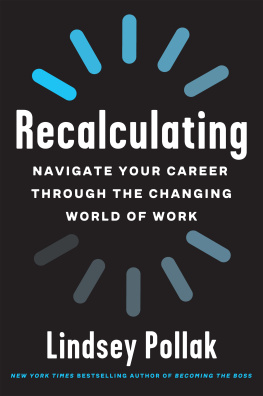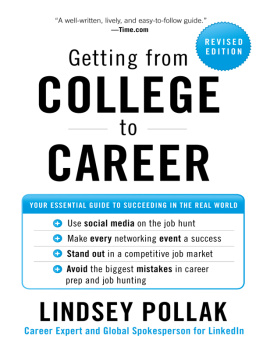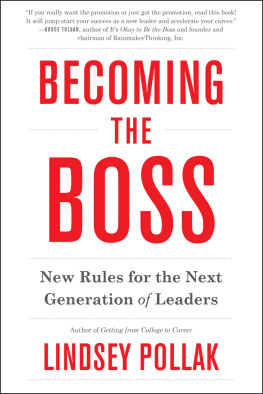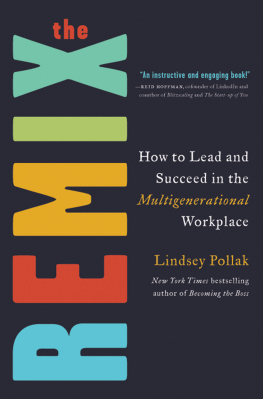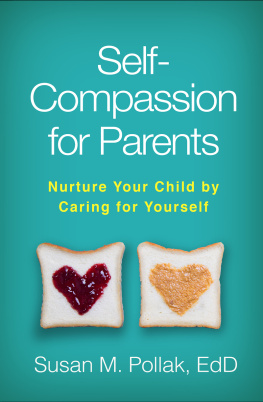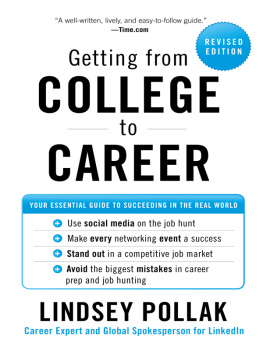Lindsey Pollak - Recalculating
Here you can read online Lindsey Pollak - Recalculating full text of the book (entire story) in english for free. Download pdf and epub, get meaning, cover and reviews about this ebook. year: 2021, publisher: Harper Business, genre: Home and family. Description of the work, (preface) as well as reviews are available. Best literature library LitArk.com created for fans of good reading and offers a wide selection of genres:
Romance novel
Science fiction
Adventure
Detective
Science
History
Home and family
Prose
Art
Politics
Computer
Non-fiction
Religion
Business
Children
Humor
Choose a favorite category and find really read worthwhile books. Enjoy immersion in the world of imagination, feel the emotions of the characters or learn something new for yourself, make an fascinating discovery.
- Book:Recalculating
- Author:
- Publisher:Harper Business
- Genre:
- Year:2021
- Rating:4 / 5
- Favourites:Add to favourites
- Your mark:
- 80
- 1
- 2
- 3
- 4
- 5
Recalculating: summary, description and annotation
We offer to read an annotation, description, summary or preface (depends on what the author of the book "Recalculating" wrote himself). If you haven't found the necessary information about the book — write in the comments, we will try to find it.
Recalculating — read online for free the complete book (whole text) full work
Below is the text of the book, divided by pages. System saving the place of the last page read, allows you to conveniently read the book "Recalculating" online for free, without having to search again every time where you left off. Put a bookmark, and you can go to the page where you finished reading at any time.
Font size:
Interval:
Bookmark:
To Evan and Chloe,
and to every brave recalculator
Do not judge me by my successes. Judge me by how many times I fell down and got back up again.
NELSON MANDELA
Do you remember exactly where you were when you first heard about COVID-19?
I dont, and that seems strange to me. Usually when you come across stories about previous history-altering momentsJFKs assassination being the most famouspeople always talk about the exact moment they heard the news.
But the pandemic was different. In late 2019 to early 2020, the virus was background news for the United States as it spread through China and Europe. Thenas we all know too wellby mid-March 2020, the pandemic had taken over daily life, altering everyones thoughts and actions and, most tragically, taking far too many lives.
The impact of the pandemic on the economy and job market was immediate and devastating. Employers across regions and industries announced cutbacks, furloughs, and layoffs. Millions of employees who still had jobs were told to work from home. Millions of others risked their lives to perform essential jobs.
And the pandemic was only one of several disruptive elements in 2020. According to government relations expert Bruce Mehlman, 2020 is the only year on record to include four super-disruptors to society: a recession, mass protests, an intense election, and a pandemic. To put things into perspective, only three other years since 1900 had even three.
Mehlmans July 2020 report was titled The Great Acceleration: How 2020 Is Bringing the Future Faster, and that is exactly what the events of this historic year have done. COVID-19 wasnt the cause of all of the change it fostered; it was the colossal, global, unprecedented straw that broke the camels back.
This is certainly true of the amplified attention the pandemic brought to our countrys long struggles with racial injusticea necessary reckoning that will be remembered as intensifying during the early months of the pandemic.
It is true of the spotlight the virus shone on the ongoing class divides in our country, the unequal access to quality healthcare and education, and the increased burden on women as caretakers of children and the elderly.
And it is true of career and workplace transitions as well. The pandemic accelerated shifts that were already well underway by 2020, including:
- increased automation, leading to the rise of certain jobs and industries and the fall of others
- an increasing combination of remote and in-person work
- increased action on issues of diversity, equity, and inclusion in the workplace
- more integration of work and life
- more concern about, and attention to, employee health and well-being
- more questioning of the value of higher education for career and financial success
- more Americans living and working into their seventies, eighties, and beyond
In October 2020, Erik Brynjolfsson, director of the Digital Economy Lab at the Stanford Institute for Human-Centered AI, remarked, Weve seen more changes in how we work over the past twenty weeks than we have over the past twenty years. Lets delve for a moment into the acceleration of remote work. According to the Federal Reserve, the share of the U.S. labor force working from home had already tripled in the time period from 2005 to the beginning of 2020. Then, within just the last few weeks of March, the numbers surged: as of March 15, 2020, 31 percent of U.S. workers had ever worked remotely. By April 2, that number had doubled, to 62 percent.
This meant that millions of professionals went from never having heard of Zoom to spending half their days on the videoconferencing app. Parents who had never worked from home were suddenly taking conference calls with toddlers on their laps or teenagers participating in remote high school classes in the same room. Leaders who had never talked openly about race were leading virtual town halls about implicit bias and microaggressions. Recruiters who normally touted the critical importance of a strong handshake were hiring employees without ever meeting them in person.
All of this change is merely referring to the experiences of those who were fortunate enough to retain their jobs. After 128 months of economic expansion in the United Statesthe longest in the history of our countryvast employment and business opportunities evaporated in a remarkably condensed period of time. Through just the first six months following the onset of the pandemic, one in four Americans put in new claims for unemployment benefits, twenty-one million Americans switched to part-time work because they couldnt find full-time jobs, and 55 percent of small businesses closed, never to reopen. In the same period, more than four million people graduated from college in hopes of starting their careers.
I know that Im not reporting anything you dont already know. And words like unprecedented, historic, and catastrophic have become clich when describing the events that have taken place since the emergence of COVID-19. But we cannot and should not gloss over the enormity of what has transpired in such a short period of time: since the beginning of 2020, every single person around the world has experienced a collective, unplanned, unwanted disruptionfar worse for some than othersand it has changed every single one of our career trajectories in one way or another.
No matter what brought you personally to this moment, whether you are currently unemployed, employed, self-employed, or still not sure what day it is, I honor you for arriving here. Living and working in these times is not for the faint of heart. Recalculating is here to help.
When I first started to think about all the people thrown unexpectedly into career transition during the initial stages of the pandemic, I kept imagining that moment when youre driving a car and the road forks, or you make a wrong turn, or you miss an exit. If youre using the GPS on your phone or another device, it will glitch for a few seconds and then a robotic voice will say, Recalculating, sometimes over and over again (I admit I dont have the best sense of direction).
Now imagine every working adult on the planet in our cars, hearing this voice, all at the exact same time.
Maybe youre a recent grad trying to find your path after college. Maybe you were laid off from a longtime position in a dying industry and need to reinvent yourself in a new field. Maybe youre thinking about launching an entrepreneurial venture or freelance career or joining the gig economy. Maybe the health crisis, the Black Lives Matter movement, or an environmental disaster has inspired you to pursue a different, more personally meaningful career path. Maybe you are a stay-at-home parent who wants to reenter the workforce. Maybe youve decided to recommit to a job that you had been losing interest in. Maybe you change your mind every hour and youre not sure exactly what you want from your career.
No matter what your specific situation, this book is for you. Even if you are not currently in a moment of major transition, you are likely making readjustments and pivots all the time to keep up with the rapid pace of change. In the twenty-first-century workplace, standing still means being left behind. We are all recalculators now.
Recalculating is no doubt a challengebut its also an opportunity. As I started to think about what happens when a GPS is recalculating, I felt a growing sense of optimism. After all, when the navigation app is recalculating, its demonstrating that there are multiple ways to get wherever you want to go. It factors in how far youve come already. And, if you decide to change your destination entirely, it can get you there as well.
Font size:
Interval:
Bookmark:
Similar books «Recalculating»
Look at similar books to Recalculating. We have selected literature similar in name and meaning in the hope of providing readers with more options to find new, interesting, not yet read works.
Discussion, reviews of the book Recalculating and just readers' own opinions. Leave your comments, write what you think about the work, its meaning or the main characters. Specify what exactly you liked and what you didn't like, and why you think so.

